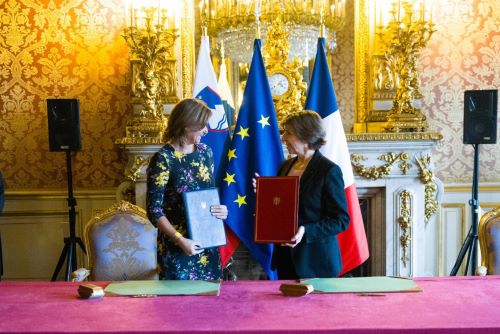During her official visit to Paris, Slovenian Minister of Foreign Affairs Tanja Fajon and Catherine Colonna, Minister for Europe and Foreign Affairs of France, discussed strengthening cooperation between the two countries and concluded a new Strategic Partnership Action Plan.
The ministers signed a Franco-Slovenian action plan that defines the strategic partnership between our two countries for the period of 2024-2027. They hailed the excellent bilateral relationship between France and Slovenia and our two countries’ close cooperation within the EU and the UN; this comes as France holds the monthlong Security Council presidency, which it took up on January 1, and Slovenia was elected to a two-year term as a non-permanent member. The ministers also discussed joint economic projects between our two countries, particularly in the transportation, nuclear and aerospace sectors.
The ministers addressed the international situation as well as the situation in Europe. They stressed their unwavering support for Ukraine in the face of Russia’s continued illegal, unjustified aggression, in defiance of international law and the principles of the UN Charter. While renewing their commitment to EU membership for Ukraine and Moldova, Ms. Colonna and Ms. Fajon agreed that the EU’s enlargement to include the Wester Balkans was a strategic necessity and that the membership process as a whole should be accompanied by a reform of European institutions.
Lastly, the ministers agreed on the need to maintain regional stability in both the Balkans and the Caucasus. In the Middle East, three months after the terrorist attacks carried out by Hamas, France reiterates its staunch commitment to promoting a just and lasting peace as part of the two-state solution and the need to avoid a regional escalation.
Minister Fajon stressed that Slovenia will strive to overcome differences in the UN Security Council and actively seek opportunities to promote its priorities.
“I am delighted that Minister Colonna and I have signed the fourth Strategic Partnership Action Plan, which covers a number of areas of cooperation between the two countries over the next four years. France is an extremely important partner for Slovenia, especially in terms of investment. I hope that we will soon reach an agreement to strengthen Revoz’s production in Slovenia. We also discussed how to increase economic and political cooperation between the two countries and how to jointly address the humanitarian catastrophe in Gaza and reach a lasting ceasefire and a two-state solution as soon as possible. Slovenia and France are now sitting together at the same table in the United Nations Security Council (UNSC) and I would like to take this opportunity to thank France for assisting us in this extremely important task by sharing its knowledge and experience,” said Minister Fajon after her meeting with Minister Colonna.
Slovenia and France cooperate in a number of areas, and France is one of Slovenia’s priority markets in terms of business, tourism and connectivity with other destinations. Therefore, Minister Fajon welcomed the good air connectivity between the two countries and stressed that she still sees room for manoeuvre for more flights to and from France, also in the light of the upcoming 2024 Summer Olympics.
The Slovenian and French ministers also touched on the Western Balkans. In the changed geopolitical situation, they agreed it is essential to speed up the enlargement process, assuming that countries implement reforms faster. It is in this region that Slovenia and France have supported a joint initiative on the Western Balkans Cyber Capacity Centre (WB3C) project. “I look forward to our joint visit to Podgorica for the opening of the premises this coming spring. We are pleased that the Centre has already started operations and that the first activities are already underway. The Centre will certainly contribute to operational capacity, regional networking of cybersecurity experts, the establishment of consistent protocols and practices in the region, which is key to effectively prevent malicious cyber activities,” Minister Fajon underlined, explaining that she will continue to urge the Montenegrin Government to complete the premises of the Centre by the end of March.
The talks also focused on cooperation between Slovenia and France in the UN Security Council, where they have been serving together since January – France as a permanent member and Slovenia as a non-permanent member with a two-year mandate. Minister Fajon thanked her colleague for her support in Slovenia’s preparations for membership, and explained that Slovenia will remain open to suggestions in the Security Council: “We will support all efforts to improve the situation in the Middle East. At the same time, we must pay equal attention to the rapidly evolving situation in Africa, where we are facing a deteriorating security environment and increasing pressure on UN operations and missions. We must not forget that peace and stability in Africa have a direct impact on the situation in Europe, especially with the ever-increasing migration flows.” France, with its extensive experience in this body, is an important and valuable partner for Slovenia.

